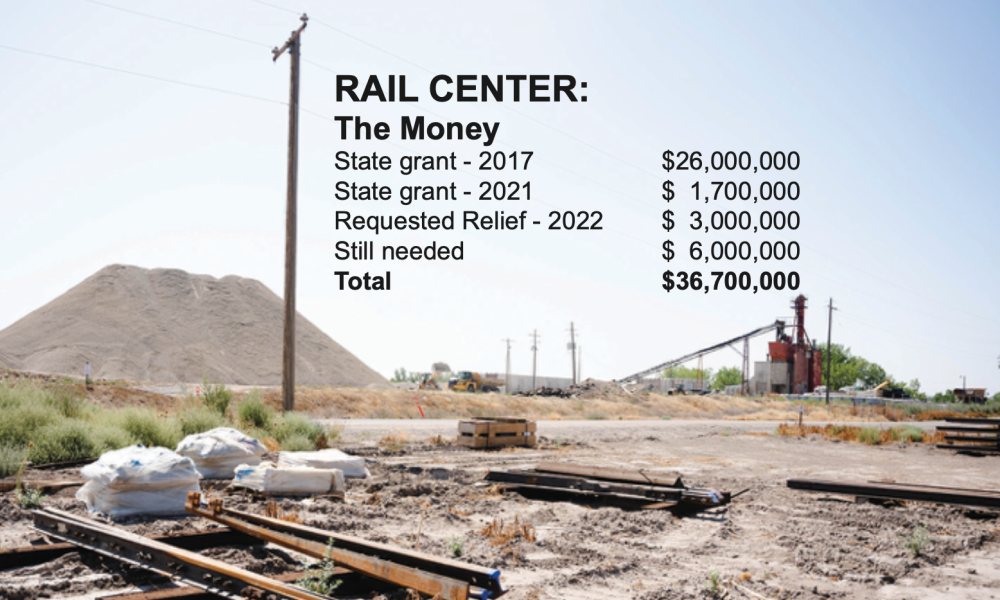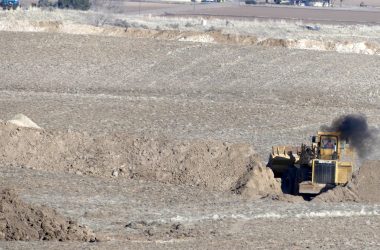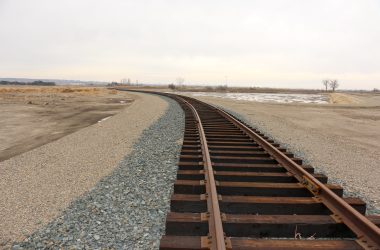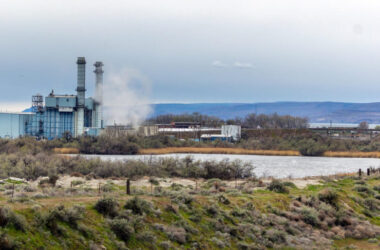NYSSA – The money crisis is worsening for the Treasure Valley Reload Center with officials saying last week that they are $9 million short.
State officials are engineering an emergency taxpayer bailout of $3 million to help, but the source for the rest isn’t clear.
Without millions more, project leaders estimate they can put up the shell of the shipping warehouse but without key features such as cooling to protect produce, a train engine to shuttle rail cars, and even office furnishings.
They face the money crunch because costs continue rising so fast that budgets become obsolete in just a month. That means figures provided last week might not hold and that another $9 million won’t be enough.
The shortfall was revealed in a public meeting last week where project leaders absolved themselves of blame for continuing cost overruns. Among their other disclosures:
•Pay to a key contractor is more than double what was expected last fall, costing the rail project an extra $7 million. That alone has impaired the project.
•A plan to arrange additional construction work without bidding would violate state law, a lawyer warned.
•Onion officials again complained the shipping building is too grand, suggesting their knowledge of onion sheds trumps the expertise of Americold, the multinational giant with shipping centers worldwide. Americold months ago detailed features it needed in the Nyssa building to run the new shipping operation.
•Money intended to start warehouse construction is being shifted to pay other cost overruns, stalling work on the warehouse foundation.
“It is important for the board to understand that none of us created this.”
–Brad Baird, project engineer from Anderson Perry & Associates
The project troubles came into sharp focus at a meeting of the board of the Malheur County Development Corp. on Tuesday, Aug 23. That’s a board of five local people appointed by the county to manage the project. That includes Grant Kitamura of Baker & Murakami Produce Co., Corey Maag of Jamieson Produce, Jason Pearson of Eagle Eye Produce, Kay Riley, retired onion company executive, and Lynn Findley, state senator.
The directors had been advised for months of mounting costs, blamed on inflation and “unforeseen” conditions on the irrigated farmland north of Nyssa. They based their decisions on informal budgets that were ever changing and modified on occasion with whiteout. Until recently, they had not been told the project’s total costs – and they had not asked.
They found out last week – unfunded features would take about $6 million and that would still leave a long-planned access road off the table.
Brad Baird, president of the engineering company supervising the project, for the first time put a price tag on elements that he had advised previously couldn’t be afforded.
He did so less than 24 hours before the meeting, requested to do so by Findley. Findley was hosting legislators for two days and wanted to share the bottom-line figure.
His request came days after the Malheur Enterprise in an editorial called on legislators to determine the total cost to finish the terminal and provide the extra money needed to reach that figure. The editorial noted that project officials had been ignoring requests for the total cost figure.
The number is important because Findley and his legislative counterpart, state Rep. Mark Owens, R-Crane, are asking their colleagues for an extra $3 million to help the Nyssa project. They haven’t revised the request since May despite the climbing costs, and other state officials are relying on representations that $3 million is what’s needed from taxpayers.
READ IT: $3 million request
“We believe we can get it operating for $3 million,” Findley said last week. He didn’t attend the development corporation board meeting where Baird presented the new numbers.
Baird noted the $3 million is expected from the legislative Emergency Board in September. That request is being made for the county by the Oregon Department of Transportation, and agency officials said last week no one asked for a change in the number.
But even if legislators approve the emergency grant, Baird said millions more is needed to get Treasure Valley Reload Center into a functioning rail center.
“If we don’t get the additional $6 million, we would have the building erected on a slab and the road able to be used. You could potentially use the site but it won’t be properly equipped for building operations,” Baird said.
He said another $3.5 million was needed to equip the terminal building, $2.25 million for roads and utilities, and $250,000 for a train engine to shuttle rail cars. He noted the actual cost for the engine was “unknown” though the project budget has been in place in various forms for more than five years.
Board members had little reaction to the updated budget dilemma. They took no steps to direct Greg Smith, the project leader, or Baird to act on the funding shortfall.
Malheur County officials have said they will put no more local money into the project, and efforts to arrange more state borrowing so far have flopped. The best options remain yet another taxpayer bailout – and help from the company retained to run the center.
The company directors again discussed pressuring Americold to put in money for the project. They tried and failed at that effort earlier this year when Americold turned aside a $2.5 million request. The company said it is already spending $5 million to get three shipping centers elsewhere in the U.S. in equipped to handle Oregon onions.
Kay Riley, a retired onion company executive and director of the public company, complained that directors have had no say about features for the building.
“We’re just taking Americold’s word for it,” Riley said of a company that project leaders boasted of landing to run the Nyssa center profitably.
Baird said project leaders should get Americold officials “in a room” and insist they pay for elements the company wants. He said the specialized air control system alone is estimated to cost $1.1 million.
Baird also used the meeting to excuse the directors and project leaders from blame for the cost overruns.
“It is important for the board to understand that none of us created this,” Baird said.
He tutored the board on construction cost factors, citing statistics from the Engineering News-Record, a construction industry publication, that showed the inflation costs to build in the Pacific Northwest between 2017 and 2022 climbed by about 40%.
The state in 2017 awarded $26 million to build the Treasure Valley Reload Center and budgets in recent years contained no contingency – standard as an emergency reserve for unexpected costs such as inflation.
Baird listed the rising cost of diesel, rental equipment and earthwork as key factors in the budget overrun. Inflation has been about 8.5% the past year.
“The expenses just keep climbing. It is a significant impact,” Baird told the board.
Baird didn’t note that the largest contract, to Steve Lindley Contracting, was awarded not five years ago but last October.
And so far, project officials have not needed to increase the price for one other key contract awarded for the project – $5 million for placing the rail ties and lines.
But the mushrooming costs of the Lindley contract are imperiling the project.
Lindley was retained for $5.2 million to level the ground, fill in wetlands and get the property ready for rail spurs and the building. Construction crews soon encountered ground more water logged than expected and a wetland whose depth engineers never established.
Baird’s company gave the go-ahead to keep filling in until a buildable base could be established and that has proven a costly effort that had little to do with inflation.
According to contract records, Baird’s company said in bid documents last summer that 17,400 tons of large rock would be needed to stabilize the ground beneath the rail spurs. By the end of July, Lindley had billed for 106,481 tons of such rock. The contract records show the price per ton hasn’t changed since March.
But Baird alerted the board that Lindley’s total bill for the reload project now was projected to be $12.5 million.
That was about $2 million more than Baird’s company estimated just a month earlier, and even Baird was shocked.
“This last news got me a little worked up,” Baird told the board. “We had a come-to-Jesus meeting” at his company, Anderson Perry & Associates.
Baird and Smith recently had planned to get going on constructing the foundation for the reload building even before the state emergency aid was delivered. They intended to take money from a $2 million fund intended for roads and utilities.
But now, Baird reported, there is only $100,000 left in that fund because the rest had to be diverted to cover Lindley’s costs.
Even if the money was on hand, the rush to start that work hit a legal hurdle last week.
Baird and Smith planned to simply give the contract for that work to a Washington state company.
Brian DiFonzo, attorney for Malheur County Development Corp., said they couldn’t do that. The company first has to outline why the work should not go out to bid, a public hearing on that is needed, and then the board needs to act. DiFonzo gave no indication the timing for that.
Company officials didn’t respond to questions about whether DiFonzo’s counsel meant they also had to change their plans to skip bidding to award $2 million in road and utility work.
News tip? Contact reporter Pat Caldwell at [email protected]
PREVIOUS COVERAGE:
Your guide to the Treasure Valley Reload Center – get the history, purpose and status
Governor pushes extra $3 million for Nyssa rail center to cover costs overruns
Rail board wants to keep Smith, double his compensation for the next year
County judge says $26 million should be enough for Nyssa rail center
Malheur County blocks Enterprise from news conference on rail center
Engineering costs for Nyssa project jump with belated contract change
Nyssa rail center stopped in its tracks – no money for building
EXCELLENCE IN JOURNALISM – Available for $7.50 a month. Subscribe to the digital service of the Enterprise and get the very best in local journalism. We report with care, attention to accuracy, and an unwavering devotion to fairness. Get the kind of news you’ve been looking for – day in and day out from the Enterprise.




